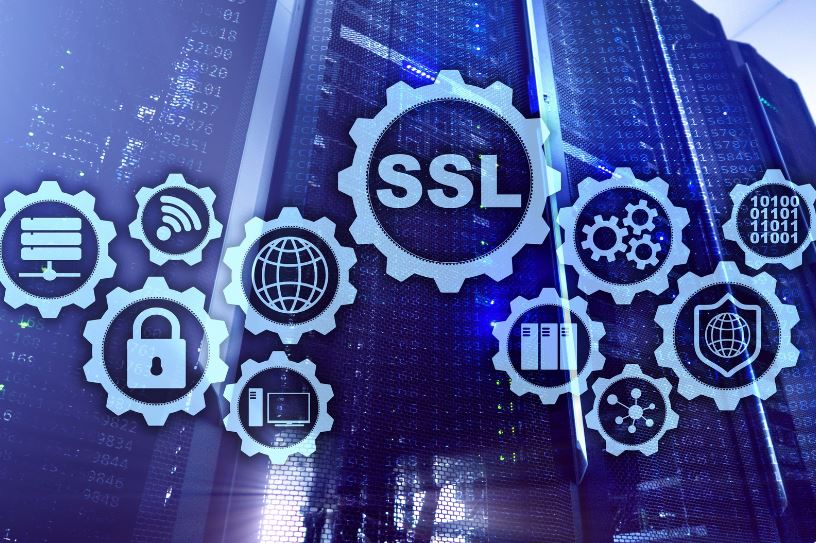Last Updated on
Decrypting SSL: What is SSL?
SSL, or Secure Sockets Layer, is the invisible armor that safeguards the data transfer between two systems, preventing eavesdroppers from accessing the information. The protocol of trust manifests as the tiny padlock in the address bar, transforming HTTP into HTTPS.

How SSL Works: The Art of Encrypted Communication
SSL works by employing a process called asymmetric encryption. The server provides a public key when a user connects to an SSL-secured website. The user’s browser then uses this public key to encrypt any data sent back to the server. Then, the server uses its private key to decrypt this data, maintaining the security of the information transmitted.
Types of SSL Certificates: Choose Wisely
There are different types of SSL certificates available, each with a specific purpose:
- Domain-Validated (DV) SSL Certificates: These certificates provide basic encryption, are relatively quick to get, and are generally cheaper. They are best suited for small websites and blogs where financial transactions are not performed.
- Organization-Validated (OV) SSL Certificates: A level up from DV requires more scrutiny before issuance. They’re apt for corporate and public-facing websites where data security is crucial.
- Extended Validation (EV) SSL Certificates: These are the crème de la crème of SSL certificates. They demand an extensive verification process but provide the highest level of trust. Large businesses and e-commerce websites prefer EV SSLs.
Why SSL? Decrypting the Benefits
Adopting SSL is not an option anymore; it’s a necessity. Let’s explore why:
- Data Protection: SSL ensures that the data transmitted between users and websites is secure, encrypted, and not accessible to third parties.
- Identity Verification: It verifies the identity of the organization or individual behind the website, helping prevent phishing and spoofing attacks.
- SEO Boost: Google prefers sites that use SSL, considering them more trustworthy, which could result in higher search engine rankings.
- Customer Trust: When users see the padlock symbol or HTTPS, it instills confidence in your website’s security measures, encouraging them to stay and interact.
Implementing SSL: A Step-by-Step Guide
Integrating SSL into your website might seem daunting, but the process is relatively straightforward. Here’s how you can do it:
- Choose the Right SSL Certificate: As discussed earlier; the selection depends on your website’s purpose, size, and security needs.
- Purchase the SSL Certificate: Once you’ve chosen the correct SSL certificate, you need to purchase it from a trustworthy Certificate Authority (CA).
- Activate and Install the Certificate: After purchasing, you’ll receive instructions on activating and installing the SSL certificate on your server.
- Configure your Site to Use HTTPS: After installation, ensure your website uses HTTPS by updating the site’s configuration. Test to make sure everything runs smoothly.
SSL vs. TLS: The Ongoing Debate
While SSL has become the colloquial term for secure data transfer, the current standard is Transport Layer Security (TLS). They work on similar principles, but TLS is more secure due to its advanced encryption algorithms. Regardless, both provide a safe environment for data transfer.
Final Words: The Future of SSL
With cybersecurity threats becoming increasingly sophisticated, the importance of SSL and its successors like TLS will only rise. SSL is no longer a luxury but a baseline necessity for any website. Its role in data protection, SEO optimization, and building user trust makes it indispensable. It’s time to embrace SSL and fortify your digital fortress.
In the fast-paced digital world, Secure Sockets Layer is more than just an add-on—it’s your first defense in building a secure and trustworthy digital presence. And while SSL may sound intimidating, understanding its intricacies is critical to unlocking a safer and more secure digital world.
FAQs
What is an SSL certificate, and why do I need it?
An SSL (Secure Sockets Layer) certificate is a digital certificate that provides encryption and authentication for secure communication between a website and its visitors. It ensures that the data exchanged between the user’s web browser and the website’s server is encrypted and protected from unauthorized access.
Here are a few reasons why you need an SSL certificate:
- Data encryption: An SSL certificate encrypts the data transmitted between a user’s browser and the website’s server. This encryption ensures that sensitive information such as login credentials, personal details, and financial transactions are protected from being intercepted or accessed by malicious third parties.
- Trust and credibility: An SSL certificate lets your website display the padlock icon and the “https://” prefix in the browser’s address bar. These visual indicators signal visitors that your website is secure and their data is transmitted safely. This helps build trust and credibility, especially when handling sensitive information or conducting e-commerce transactions.
- SEO benefits: Search engines, like Google, consider SSL encryption a ranking factor in their algorithms. Websites with SSL certificates are more likely to have higher search engine rankings than non-secure websites. Having an SSL certificate can, therefore, improve your website’s visibility and organic traffic.
- Compliance with regulations: Many data protection regulations, such as the General Data Protection Regulation (GDPR), require websites to protect user data by implementing appropriate security measures. An SSL certificate helps demonstrate your commitment to data security and compliance with these regulations.
- Secure online transactions: If you run an e-commerce website or handle online transactions, an SSL certificate is essential. It ensures that customer payment information is encrypted and protected, reducing the risk of credit card fraud or data breaches.
- Enhanced customer trust: In today’s digital landscape, users have become increasingly aware of online security risks. Displaying a trusted SSL certificate reassures visitors that their data is being handled securely, which can lead to increased trust, conversions, and customer satisfaction.
To obtain an SSL certificate, you can purchase one from a trusted certificate authority (CA) or through your web hosting provider. There are various types of SSL certificates available, including domain-validated (DV), organization-validated (OV), and extended validation (EV) certificates, each offering different levels of validation and security features.
It’s important to note that starting in September 2021, Let’s Encrypt, a widely used certificate authority, began issuing wildcard certificates for free, making it more accessible for website owners to secure their domains.
Is it necessary to have an SSL certificate?
Having an SSL certificate is highly recommended for most websites, and in some cases, it may be necessary. Here’s why:
- Data security: An SSL certificate encrypts the data transmitted between a user’s browser and the website’s server, protecting it from interception and unauthorized access. Suppose your website collects sensitive information, such as login credentials, personal data, or payment details. In that case, securing that data with SSL encryption is crucial to safeguard your users’ information.
- User trust: Internet users have become increasingly cautious about online security. Seeing the padlock icon and “https://” in the browser’s address bar instills confidence in visitors, assuring them that their connection is secure. This builds trust and encourages users to engage with your website, especially if they need to provide personal information or make online transactions.
- SEO advantages: Search engines like Google consider SSL encryption a ranking factor. Websites with SSL certificates are more likely to have higher search engine rankings than non-secure websites. Implementing SSL can potentially improve your website’s visibility and organic traffic.
- Compliance requirements: Many data protection regulations, such as GDPR (General Data Protection Regulation) in the European Union, require websites to protect user data and implement appropriate security measures. SSL encryption helps meet these compliance requirements, demonstrating your commitment to data security.
- E-commerce and online transactions: If you run an e-commerce website or handle online transactions, having an SSL certificate is essential. It ensures the security of customer payment information, protecting against credit card fraud and data breaches. Most payment processors and e-commerce platforms require SSL encryption to be in place for secure transactions.
While having an SSL certificate is not technically mandatory for all websites, the increasing emphasis on online security, user expectations, and compliance regulations make it highly advisable. SSL encryption protects your website and visitors helps establish trust, and supports your online presence.
It’s worth noting that major web browsers, like Google Chrome, have started flagging non-secure websites with warning messages, which can negatively impact user perception and traffic. Therefore, investing in an SSL certificate is wise for most website owners.




